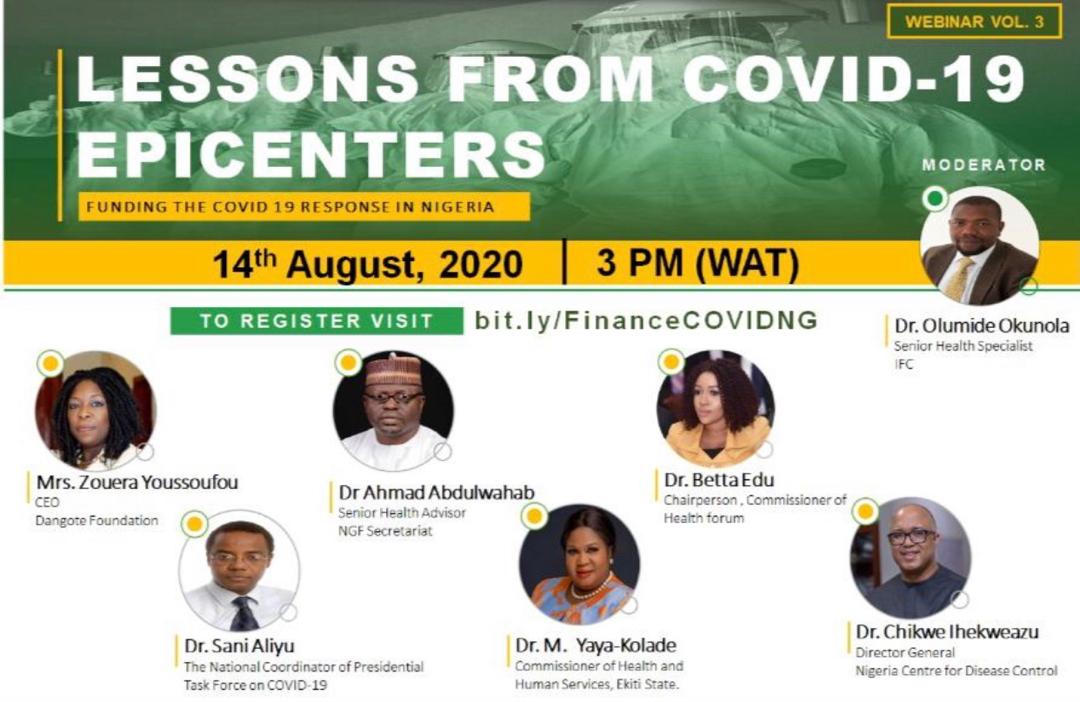
Funding the COVID-19 Response at Sub-National Level in Nigeria
On the 14th of August 2020, ACIOE Associates hosted the third of its health webinar series focusing on Lessons from COVID-19 epicenters. The webinar had as the theme; FUNDING THE COVID 19 RESPONSE IN NIGERIA.
The webinar begun with a welcome speech by the ACIOE Associates team which was followed by a presentation from the World Bank on ‘financing efforts to mitigate COVID 19 challenges and improve the capacity of the health sector” in Nigeria. The presentation was followed by a panel discussion and Q&A session. Highlights from the webinar are detailed below:
Ayo Ajiboye: World Bank Support for Nigeria’s COVID-19 Response
- The World Bank has set up the Regional Disease Surveillance System Enhancement II (REDISSE II) Project. The fund was approved in March 2017 and took effect from February 2018. The fund has approved financing of $ 90million of which $82.5 million is undisbursed. $ 18.7 million has been committed to COVID 19 response.
- The World Bank has also set up the Nigeria COVID 19 preparedness & response project (NIGERIA COPREP), aimed at mitigating the effects of the pandemic at national and sub-national levels. The total projected financing for the project is $114.28 million. This fund is to aid pandemic containment efforts in states (subnational) through; (i) establishment, activation, and operationalization of EOCs in States where needed, (ii) epidemiological investigations, and contact tracing; (iii) strengthening risk assessment and surveillance; (iv) on-time data collection and analysis for data-driven decision-making; (v) additional support to laboratories for early detection and confirmation including sample collection systems; (vi) training needs; (viii) equipping, furnishing and renovation of isolation centers and treatment centers including community support centers; and (ix) improve patient transfer systems through the financing of ambulances and training as needed. $90 million has been earmarked for this phase.
- At federal level, the fund is to support the procurement of COVID19 related commodities and surge financing gaps in surveillance, case detection, confirmation, contact tracing, and case management. $14.28m has been earmarked for this phase.
- The second component of the Facility is coordination and project management ($5m budgeted), and monitoring and evaluation including learning agenda ($5 million) budgeted.
- Strict eligibility criteria have to be met by states to access the financing including establishment, signed MoU with NCDC, established tracing and contact capacity, technical committee approval of action plan, FM due diligence, data reporting, and implementation progress reports.
- As of August 13, 2020. All 36 states have submitted IAP’s for REDISSE II and Nigeria CoPREP. All 36 states have been cleared by the World Bank. 29 states have received N 100 million each.
The Panel discussion followed the world bank presentation. The discussion was moderated by Dr. Olumide Okunola, Senior health specialist at IFC. The panelists included: Dr. Chikwe Ihekweazu (Director-General, Nigeria Centre for Disease Control), Dr. Ahmad Abdulwahab (Senior Health adviser, NGF secretariat), Mrs. Zouera Youssoufou (CEO, Dangote foundation), Dr. Betta Edu (Chairperson, Commissioners of health forum, and commissioner of health Cross River state), and Dr. M Yaya-Kolade (commissioner of health Ekiti state). Key takeaways from the panel discussion are highlighted below.
Dr. Chikwe Ihekweazu:
- In response to how the NCDC has been funding its activities and the challenges, it has faced thus far. Dr. Ihekweazu emphasized that we as a society have to decide how much value we place on health security.
- The total capital budget for NCDC last year was less than N 1 billion. A joint internal evaluation gave a 39% effectiveness score on effectiveness considering parameters. The evaluation recommended that 5% of the federal budget should be for public health security from the current 2.5%.
- NCDC has entered strategic partnerships to get funding for its activities before COVID. In light of the pandemic, CACOVID and the World Bank have been great sources of financial support for the NCDC’s response activities.
- While funding has been good, funding efforts have to be maintained in a stable, substantial, and sustainable manner.
- The challenge is to ensure that the responses and momentum garnered are used to build up capabilities for future pandemics and leverage resources garnered now for future health emergencies.
- States should start building human capacities to absorb and expand the resources being made available to them sustainably.
- Private sector sensitization and continued involvement in public health through equipment provision and logistics are needed and should be encouraged in the long run.
Zouera Youssoufou:
- It’s difficult to mobilize private sector involvement when there is no pandemic as companies are more concerned about their bottom lines. With the pandemic, there was an obvious emergency which made it easier to mobilize funds. This mindset has to be altered.
- COVID 19 has ensured a great case for mobilization especially in comparison to other pandemics such as Lassa fever and Ebola.
- The private sector is contributing to the Basic Healthcare Fund and the continued participation of the private sector has to be encouraged.
- Private-public partnerships (PPP) are the panacea to sustaining research and investment in healthcare considering the cost and complexity of healthcare provision. They are however complicated by conflicting interests and priorities on both sides. Having conversations about them is, however, the beginning of the process.
Dr. Ahmad Abdulwahab:
- The Nigerian Governors Forum (NGF) has afforded states a platform to share ideas. State governments have met 14 times since the beginning of the pandemic to discuss areas of cooperation.
- IGR for the states stood at N 216 billion as of 2016, this has increased to N 1.3 trillion in 2020, but is still not enough. States are still heavily reliant on federal allocation to meet basic health requirements and budgetary provisions. States have agreed to spend 15% of their budgets on health with a couple of states already meeting this benchmark.
- NGF has been able to harness good practices from several states with marked success in COVID response and has mirrored them in other states.
- States have also begun rolling out state health insurance schemes with 14-16 states already enrolling beneficiaries. The private sector is encouraged to participate in this scheme.
Dr. Betta Edu:
- A lot of technical and financial support is needed by the states, and the pandemic presents a unique opportunity to improve state response mechanisms.
- Different states are at differing stages of response due to resources. Political will at state and local government levels are key to effective response systems. A lot of funding has been available but have only been recently made available to the states. CACOVID has been at the fore of state aid and financing.
- The Save 1 million lives initiative has not had the desired effect. The state health insurance scheme will be very helpful in bridging healthcare gaps.
- Some states have had to access local government funds in response to pandemic challenges. The N100 million World Bank fund is thus a welcome development for most states.
Dr. M Yaya-Kolade:
- Ekiti state was the first to draw from the world bank’s COPREP fund. The state had limited infrastructure to combat the pandemic at inception.
- The state has used the resources along with those from CACOVID, MTN, and other private entities to; train 64 lab scientists, build and equip isolation centers, build the capacity of frontline workers, risk communication and basic equipment/infrastructure provision.
- The state has also inaugurated a task force which has a proactive mandate toward the pandemic.
- Ekiti state has also scaled research and surveillance testing with the funds available.
- Effective and judicious spending is important. Management and Evaluation mechanisms are very key in ensuring accountability and transparency in health financing.
After the panel discussion and Q&A sessions, the Managing Partner of ACIOE Associates, Mr. Ekenem Isichei gave a vote of thanks to panelists and participants as part of the closing remarks to end the webinar.

